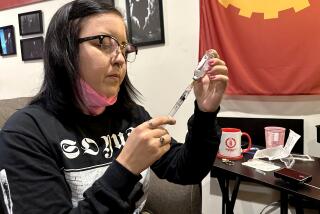A Message from Ed Reyes
- Share via
The American Diabetes Assn. is putting on Los Angeles Expo 2011 on Saturday, May 21, at the Los Angeles Convention Center. It’s big (more than 100 exhibitors). It’s fun (cooking demos, games and arts for the kids). And it’s free. I urge you to go whether you have diabetes or not. It is important to find out if you or a loved one have or are prone to diabetes.
I speak from personal experience. Let me tell you about my 15-year-old son, Adan. I became concerned after noticing changes in his appearance and behavior. His face was pale with dark eye sockets. He made frequent trips to the restroom and drank lots of water. He was listless and fatigued. The academic stresses, social pressures and poor eating habits of a typical high school teenager just made it worse.
My wife, Martha, and I took him to a hospital where he was misdiagnosed by a doctor who said he had a bad cold or flu and didn’t need blood tests. Something just didn’t seem right. Within two days his health deteriorated. So we sought a second medical opinion and insisted on blood tests. After tests revealed dangerously high blood sugar levels, he was immediately sent to the hospital. Adan was diagnosed with Type 1 diabetes.
What Adan experienced is not unusual. About 25.8 million children and adults — 8.3% of the population — have diabetes. Of that figure 18.8 million people were diagnosed, while 7 million are undiagnosed, according to a 2011 report from the Centers for Disease Control and Prevention. Even more startling are statistics that show diabetes rates in California have doubled in the last decade. If this trend continues, one in three Americans born today will develop diabetes in their lifetime — one in two if Latino or African, according to the American Diabetes Assn.
Diagnosis and treatment, along with healthy foods and exercise is critical, especially in the Latino community. Consider: Half of Latino adults eat fewer than five servings of fruits and vegetables daily, when seven to 11 are recommended for good health. Nearly 70% of Latinos say fruits and vegetables are difficult to buy in fast- food restaurants. Sixty-seven percent of low-income Latino adults eat fast food more than once a week, and 20% eat fast food three or more times a week, according to the association. That’s why I introduced a motion calling for a citywide ordinance that would create incentives for grocers that provide residents, especially those in low-income areas, with healthier food choices.
Diabetes goes undetected because of rising medical costs that keep many from getting regular checkups. Diabetes goes undiagnosed because symptoms such as excessive thirst or fatigue, such as what my son experienced, seem harmless or easily manageable. Diabetes goes unnoticed because we parents are so busy — many single parents working two or three jobs — that we aren’t as involved as we should be in our children’s lives. The lack of attention could mean the difference between life and death of a loved one. It’s time we pay attention. It’s time we ask questions. It’s time get educated at Expo 2011.
—Ed P. Reyes, Los Angeles Councilman, First District






